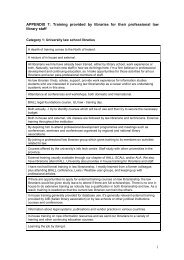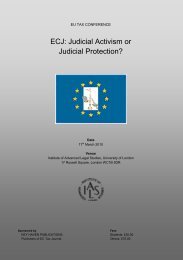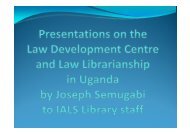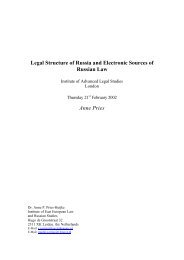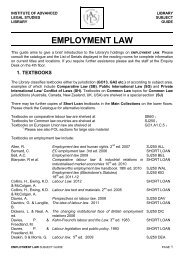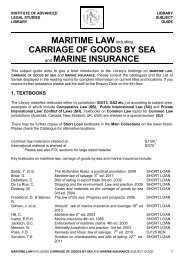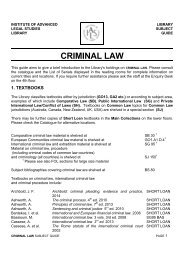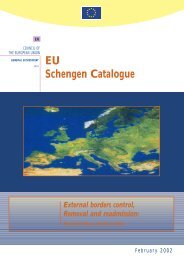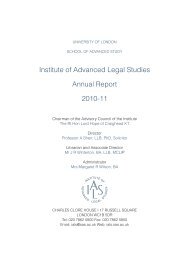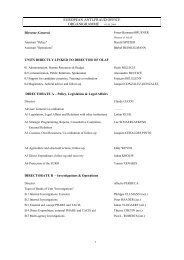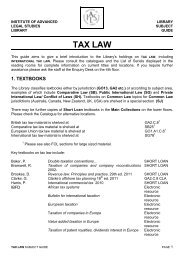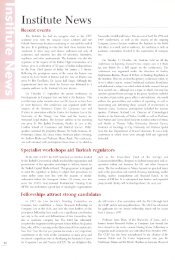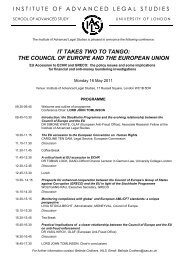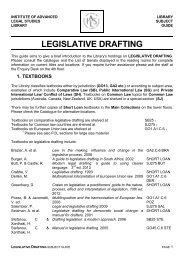a thesis - Institute of Advanced Legal Studies
a thesis - Institute of Advanced Legal Studies
a thesis - Institute of Advanced Legal Studies
You also want an ePaper? Increase the reach of your titles
YUMPU automatically turns print PDFs into web optimized ePapers that Google loves.
56 EXPRESS TRUSTS.<br />
trust, since no act remains to be done by A., and the trust is<br />
enforceable against him. Fortescue v. Barnett (1834), 3 My. &<br />
K. 36.<br />
[Note. —This decision is at first sight a little curious, since by<br />
s. 3 <strong>of</strong> the Policies <strong>of</strong> Assurance Act, 1867, it is provided that no<br />
assignment <strong>of</strong> a policy <strong>of</strong> life assurance is to confer on the assignee<br />
any right to sue for the amount <strong>of</strong> the policy until a written note<br />
<strong>of</strong> the date and purport <strong>of</strong> such assignment has been given to the<br />
assurance company. But it seems that it is no part <strong>of</strong> the duty <strong>of</strong><br />
the assignor to give the notice; this is for the assignee to do; so<br />
far as the assignor is concerned, the assignment is complete as soon<br />
as he has executed the assignment. " The trustees ought to have<br />
given notice <strong>of</strong> the assignment, but their omission to give notice<br />
cannot affect the cestui que trust" Sir John Leach, M. R., says at<br />
p. 43 <strong>of</strong> the report. This case was followed in Pear son v. The<br />
Amicable Assurance Office (1859), 27 Beav. 229.]<br />
2. A. by a voluntary deed assigns a plot <strong>of</strong> land which he<br />
holds under an agreement for a lease, with the agreement and all<br />
his interest therein, to trustees upon certain trusts. Subsequently<br />
a lease <strong>of</strong> the premises is granted to A., but the legal term thereby<br />
vested in him is never assigned to the trustees. This creates a<br />
perfect trust, the settlor having completely assigned the equity<br />
vested in him at the date <strong>of</strong> the settlement, and the subsequent<br />
grant <strong>of</strong> the lease being immaterial. Gilbert v. Overton (1864),<br />
2 H. & M. 110.<br />
3. A. writes to B., one <strong>of</strong> the trustees <strong>of</strong> his marriage settlement,<br />
a letter stating that he is desirous <strong>of</strong> making a settlement<br />
upon his four children <strong>of</strong> six policies <strong>of</strong> assurance on his own life,<br />
the particulars <strong>of</strong> which he gives. Three <strong>of</strong> the policies are handed<br />
to B., but the other three are deposited with the <strong>of</strong>fice as collateral<br />
security, but A. undertakes to pay <strong>of</strong>f the loan. The letter<br />
describes the trusts upon which the policies are to be held, and until<br />
the settlement is executed "A. is to be bound by this agreement in<br />
the same manner as if the settlement were actually executed." No<br />
notice <strong>of</strong> the letter is given to the <strong>of</strong>fice, no formal settlement is<br />
ever executed, and no notice is ever given to the other trustees.<br />
B. dies, and the letter and policies are returned to A. This is a<br />
complete assignment <strong>of</strong> the policies to B., and the trust is enforceable.<br />
In re King, Sewellv. King (1879), 14 Oh. D. 179.



